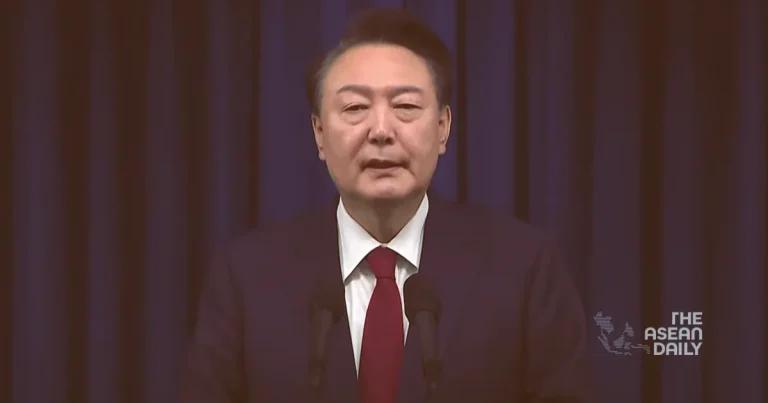7-12-2024 (SEOUL) In a dramatic turn of events that has sent shockwaves through South Korean politics, President Yoon Suk Yeol issued a televised apology on Saturday for his unprecedented attempt to impose martial law, as the nation’s parliament prepares for a crucial impeachment vote.
The president’s contrition comes amidst mounting political turmoil that has gripped the nation since his short-lived declaration of martial law earlier this week, which saw armed troops surrounding the National Assembly building in what opposition lawmakers have termed a “self-coup” attempt.
“I will not evade my legal or political responsibilities for this declaration,” Yoon stated in his brief morning address, pledging to refrain from any further attempts to impose military rule. The president indicated he would defer to his conservative People Power Party (PPP) regarding his political future, including matters concerning his presidency.
The National Assembly is set to convene at 5 p.m. today for two critical votes: first, on appointing a special prosecutor to investigate allegations of influence peddling involving the president’s wife, followed by the impeachment motion itself.
The opposition requires 200 votes in the 300-member parliament to successfully impeach Yoon. With opposition parties controlling 192 seats, they need at least eight votes from Yoon’s PPP to reach the necessary two-thirds majority. The possibility of achieving this threshold has increased following remarkable developments within the president’s own party.
In a stunning rebuke, PPP leader Han Dong-hun declared the president “unfit for office” on Friday, revealing disturbing details about Yoon’s actions during the brief period of martial law. According to Han, intelligence suggested that Yoon had ordered the defence counterintelligence commander to arrest key political figures for alleged “anti-state activities.”
This claim was later corroborated by Hong Jang-won, first deputy director of the National Intelligence Service, who disclosed in a closed-door parliamentary briefing that Yoon had indeed issued orders to detain several prominent politicians, including Han himself, opposition leader Lee Jae-myung, and National Assembly speaker Woo Won Shik.
The Defence Ministry has responded by suspending three senior military commanders linked to the martial law implementation, including defence counterintelligence commander Yeo In-hyung. Former Defence Minister Kim Yong Hyun faces rebellion charges and has been placed under a travel ban.
The crisis has raised serious concerns among South Korea’s international allies, particularly the United States and Japan, as one of Asia’s most robust democracies grapples with unprecedented political instability. The outcome of today’s parliamentary vote could determine not only Yoon’s political fate but also the immediate future of South Korean democracy.
Earlier this week, parliament voted 190-0 to cancel the martial law declaration, with 18 members of Yoon’s own party joining the opposition, demonstrating the depth of political isolation the president now faces.




